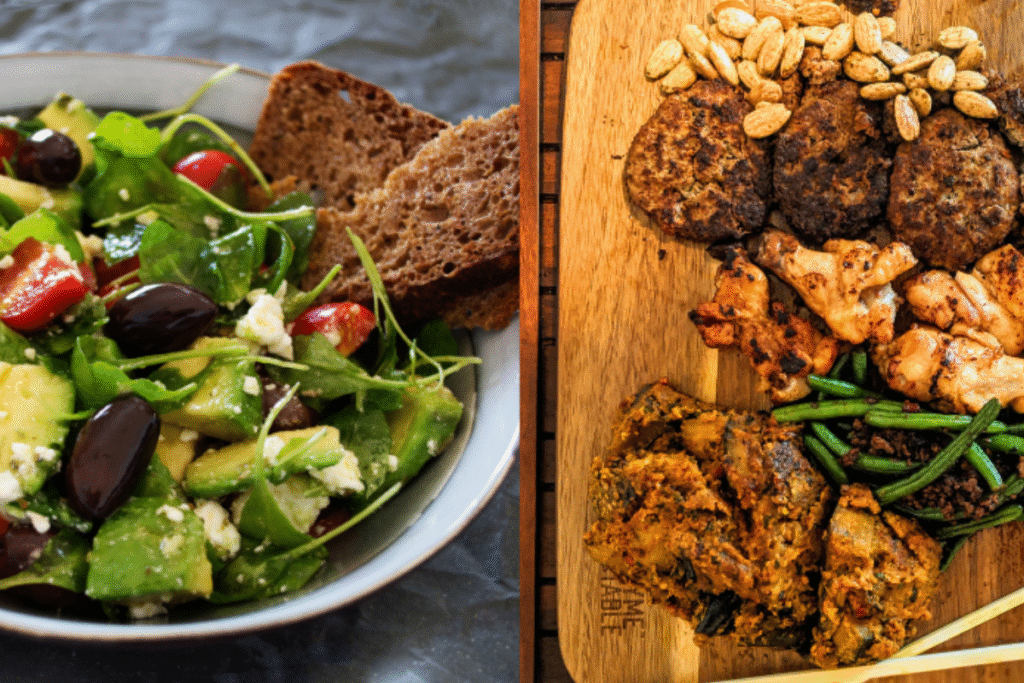
Mediterranean vs. Keto: Which Diet Is Right for You?
When it comes to popular diets for weight loss and better health, the Mediterranean and ketogenic (keto) diets are two of the most talked-about options. Both have passionate supporters and proven benefits, but they take very different approaches to nutrition.
If you’re trying to decide which one might work best for your lifestyle and goals, understanding how they compare is the first step. Let’s break down the key differences, benefits, and things to consider about each — so you can make an informed choice that’s right for you.
What Is the Mediterranean Diet?
The Mediterranean diet is inspired by the traditional eating patterns of countries bordering the Mediterranean Sea, like Italy and Greece. It’s widely regarded as one of the healthiest diets in the world — not just for weight loss, but for overall wellness and longevity.
The focus is on whole, minimally processed foods, including:
- Plenty of vegetables and fruits
- Whole grains like oats, quinoa, and brown rice
- Healthy fats, especially olive oil and nuts
- Lean protein sources like fish, chicken, and legumes
- Moderate dairy and red wine (optional)
- Limited red meat and added sugars
It’s less about strict rules and more about creating a balanced, plant-forward eating pattern rich in nutrients and healthy fats.
What Is the Keto Diet?
The ketogenic diet, or keto, is a high-fat, very low-carb diet designed to shift your body into a state called ketosis. In ketosis, your body burns fat for fuel instead of carbohydrates, which can lead to rapid weight loss.
Typical keto guidelines look like this:
- 70–75% of calories from fat (avocados, oils, butter, nuts)
- 20–25% from protein (meat, fish, eggs)
- 5–10% from carbohydrates (usually less than 50g per day)
That means cutting out most grains, starchy vegetables, fruit, and sugars. Foods like bread, pasta, rice, and even many fruits are off-limits or limited.
The result: your body adapts to burning fat for fuel, which many people find leads to quicker weight loss, more stable energy, and reduced appetite.
Key Differences Between Mediterranean and Keto
While both diets focus on whole foods and healthy fats, they differ in several important ways:
| Feature | Mediterranean | Keto |
|---|---|---|
| Carbohydrate Intake | Moderate – includes whole grains, fruits, and legumes | Very low – usually <50g per day |
| Fat Intake | Healthy fats, moderate overall | High fat, very high overall |
| Protein | Moderate | Moderate to high |
| Flexibility | Flexible and sustainable long-term | Strict and more challenging to maintain |
| Primary Goal | Overall health and heart protection | Ketosis for fat burning and weight loss |
| Research Focus | Heart health, longevity, chronic disease prevention | Weight loss, blood sugar control, neurological benefits |
Benefits of the Mediterranean Diet
The Mediterranean diet has decades of research behind it and is consistently ranked as one of the best overall diets. Its benefits include:
- Heart health: Rich in monounsaturated fats and antioxidants, it can help reduce cholesterol and lower heart disease risk.
- Weight management: A balanced approach that promotes steady, sustainable weight loss without extreme restriction.
- Longevity: Linked to a longer life expectancy and lower risk of chronic diseases.
- Digestive health: High fiber content supports gut health and regular digestion.
- Easy to maintain: Because it’s flexible and allows a variety of foods, it’s easier to stick with long-term.
Benefits of the Keto Diet
Keto also offers unique advantages, especially for specific goals:
- Rapid weight loss: Many people experience quick results due to reduced carb intake and water weight loss.
- Appetite control: High fat and protein intake can reduce hunger and cravings.
- Blood sugar regulation: Keto may help improve insulin sensitivity and stabilize blood sugar levels.
- Potential therapeutic uses: Research is exploring keto’s role in managing epilepsy, Alzheimer’s, and metabolic conditions.
Challenges and Considerations
No diet is perfect, and both have downsides to consider.
Mediterranean Diet Drawbacks
- Weight loss may be slower compared to keto.
- Requires portion control — “healthy” foods can still lead to weight gain if overeaten.
- Results may vary if processed foods sneak in.
Keto Diet Drawbacks
- Restrictive and difficult to maintain long-term.
- May cause “keto flu” (fatigue, headaches, irritability) in the early stages.
- Eliminates many nutritious foods like fruits, whole grains, and legumes.
- Not ideal for everyone — especially people with certain medical conditions.
Which Diet Is Best for You?
The right choice depends on your personal goals, lifestyle, and preferences.
- Choose Mediterranean if you want a balanced, flexible diet that supports long-term health and sustainable weight loss. It’s ideal if you value variety and don’t want to give up entire food groups.
- Choose Keto if your main priority is rapid weight loss or blood sugar control, and you’re willing to follow a more restrictive plan. Keto can work well in the short term or as a jump-start before transitioning to a more balanced approach.
Some people even combine elements of both — following a mostly Mediterranean diet but reducing carbs to encourage fat burning.
Final Thoughts
Both the Mediterranean and keto diets can help you lose weight and improve your health, but they do so in very different ways. The Mediterranean diet focuses on long-term balance, variety, and heart-healthy eating, while keto prioritizes fat burning through carbohydrate restriction.
The most important thing is choosing a plan that you can stick with and enjoy. Lasting results come from consistency — not perfection — and the best diet is the one that fits seamlessly into your lifestyle.
Related Articles You’ll Love

The Best Diet Plans Guide Team is a group of wellness writers and nutrition researchers dedicated to helping readers find simple, sustainable, and science-backed diet plans. We review products, compare meal programs, and share practical tips for healthy living at any age. Our mission is to make better health choices easier — one plan at a time.